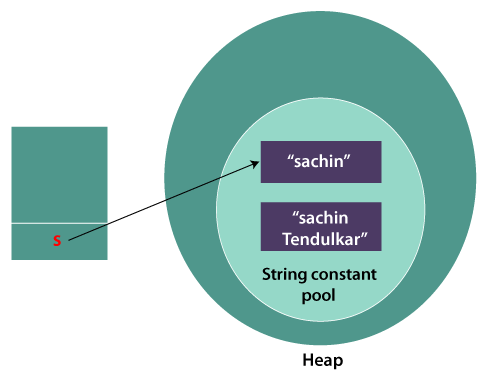Why Are Strings Immutable in Java? Thorough Evaluation for Programmers
Why Are Strings Immutable in Java? Thorough Evaluation for Programmers
Blog Article
Discovering the Advantages of Immutable Strings in Modern Programs Paradigms
In the realm of modern shows standards, the concept of unalterable strings stands as a foundation of robust software advancement. The advantages they offer go beyond plain comfort; they essentially modify the method data is handled within applications. By adopting unalterable strings, designers can guarantee boosted information stability, boosted thread security, streamlined debugging procedures, increased security actions, and efficient efficiency optimization. These advantages act as a testimony to the profound influence that welcoming immutability can carry the dependability and performance of software program systems.
Enhanced Information Integrity

By avoiding the modification of string items, immutability eliminates the threat of unintentional adjustments to the data they hold. This not only enhances the security of the details however also boosts the reliability of the code that relies upon these strings.
Immutability additionally supports more secure multithreading settings, as simultaneous accessibility to immutable strings does not present the danger of data corruption with simultaneous alterations. This property simplifies the procedure of taking care of strings in identical programs scenarios.
Basically, immutability works as a protective shield around the information stored within strings, improving their honesty by ensuring that once defined, their worths remain unmodified throughout the program's execution.

Boosted Thread Security
Immutable strings improve the string security of programs by guaranteeing that as soon as a string object is produced, its worth can not be modified. This residential property removes the danger of simultaneous threads trying to change the very same string concurrently, which might bring about data corruption or irregular states in the program - Why are strings immutable in Java?. In a multi-threaded setting, where numerous threads access and adjust data all at once, the immutability of strings offers a degree of safety by ensuring that the information continues to be unmodified throughout its lifecycle
Simplified Debugging Processes
Offered the enhanced string security facilitated by unalterable strings, a substantial benefit arises in the world of simplified debugging procedures. Immutable strings, when produced, can not be modified, making it simpler to trace the circulation of data and recognize the resource of bugs in a program. This immutability makes sure that strings stay constant throughout the implementation of the program, lowering the possibility of unforeseen modifications that might cause mistakes.
When debugging with mutable strings, designers frequently experience issues where a string's worth is modified unintentionally, making it testing to determine the source of an insect. Nonetheless, with unalterable strings, the information remains unchanged, allowing programmers to concentrate on analyzing the actual reasoning of the code instead of locating where and when a string was modified improperly.
Furthermore, unalterable strings streamline the debugging procedure by making it possible for less complicated recreation of pests. Given that unalterable strings do not alter state, designers can recreate More hints and examine insects better, bring about quicker recognition and resolution of issues within the codebase. This structured debugging operations ultimately adds to greater software program top quality and enhanced overall advancement effectiveness.

Boosted Security Procedures
Enhancing data security and strengthening system stability, the use of unalterable strings in software applications contributes considerably to increased protection steps. Unalterable strings, as soon as developed, can not be modified, supplying a crucial defense versus harmful meddling or unauthorized access. By making sure that sensitive information kept in strings remains unchanged throughout the program's execution, the threat of information breaches or shot strikes is substantially decreased. Why are strings immutable in Java?. Unalterable strings likewise play a vital duty in preventing common security susceptabilities such as barrier overflows and SQL shot strikes, as efforts to adjust string data at runtime are inherently limited.
Furthermore, the immutability of strings boosts the go to website predictability of program actions, making it less complicated to verify inputs and stop unanticipated changes that can jeopardize safety. This predictability simplifies the procedure of bookkeeping and verifying code, making it possible for designers to determine prospective safety loopholes better. Overall, incorporating immutable strings into software application development practices not only enhances the toughness and dependability of applications yet additionally strengthens their strength versus safety and security risks.
Effective Efficiency Optimization
When dealing with mutable strings, procedures like concatenation or substring production commonly result in the development of brand-new string things, leading to memory expenses and enhanced handling time. By permitting strings to stay unchangeable and consistent, unalterable strings promote far better memory management and caching opportunities, eventually enhancing the general efficiency of the software.
Immutable strings additionally play a critical role in multithreaded settings by promoting string safety. Why are strings immutable in Java?. Given that immutable strings can not be customized once developed, they can be shared throughout strings without the danger of unanticipated changes, lowering the demand for synchronization devices and boosting concurrency. Additionally, unalterable strings streamline debugging procedures as developers can trust that a string's value will certainly continue to be constant throughout the program's execution, removing prospective errors created by mutable state changes. To conclude, using immutable strings not only improves safety but likewise considerably adds to the efficient efficiency optimization of contemporary software application systems.
Verdict
To conclude, the advantages of utilizing immutable strings in modern-day programming paradigms can not be overemphasized. Enhanced data stability, boosted thread security, streamlined debugging procedures, increased safety and security procedures, and effective have a peek at this site efficiency optimization all add to the overall performance of shows jobs. By integrating immutable strings into shows practices, developers can take advantage of an extra durable and trusted codebase.
Immutability, an essential attribute of strings in programming languages such as Java and Python, guarantees that once a string item is produced, it can not be altered or customized.Unalterable strings improve the thread safety of programs by making sure that when a string object is developed, its value can not be changed. Unalterable strings likewise play a vital duty in stopping usual security vulnerabilities such as barrier overflows and SQL shot assaults, as attempts to adjust string data at runtime are inherently limited.
By permitting strings to remain constant and stable, unalterable strings help with far better memory administration and caching opportunities, inevitably increasing the total effectiveness of the software application.
Immutable strings streamline debugging procedures as programmers can trust that a string's worth will remain constant throughout the program's execution, eliminating prospective errors caused by mutable state changes.
Report this page